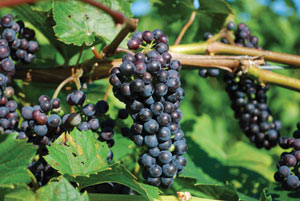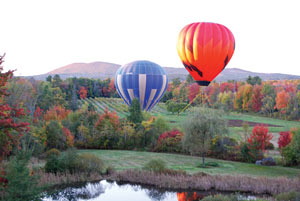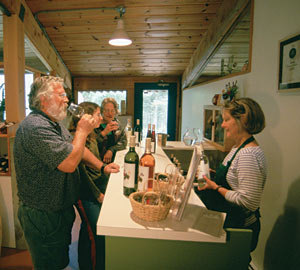Summerguide 2010
Napa, Burgundy, Tuscany…Maine? With a new bumper crop of passionate winemakers, Maine is cultivating a flavor profile all its own.
by Judith Gaines
 “I’m really proud of what Maine’s winemakers are doing now,” says Stacy Linehan, an owner of Treats, a specialty food and wine store in Wiscasset. “I don’t think locals know just how much they’ve improved! People might be surprised to pick up a bottle.”
“I’m really proud of what Maine’s winemakers are doing now,” says Stacy Linehan, an owner of Treats, a specialty food and wine store in Wiscasset. “I don’t think locals know just how much they’ve improved! People might be surprised to pick up a bottle.”
The enthusiasm that marks so many aspects of Maine’s culinary scene is bubbling up in its wine world. In the past three years, twelve new wineries have opened their doors, bringing the total number of Maine’s wineries to 20. (There were only two at the onset of 2000.) Three of the new wineries released their first wines in 2009, and three more will uncork their first bottles this summer.
The new vintners are bringing fresh excitement to the craft, while older establishments are refining their products and creating interesting new wines and blends. Maine has a new Wine Trail (www.mainewinetrail.com), a growing Wine Guild, and many opportunities for wine-themed getaways.
Not Your Ordinary Grape
Some of Maine’s vintners make the so-called “fruit wines” with fruits other than grapes–mainly blueberries, apples, cranberries, raspberries, and pears. Some make wine from grapes or grape juice brought in from out of state. And quite a few, especially the newcomers, are growing their own grapes, something many people believed could not be done in Maine. Several are experimenting with growing and fermenting techniques and with new, especially hardy types of grapes designed to survive the state’s cold climate. Many of these varieties are hybrids created by university scientists and did not exist as recently as five years ago.
The results, the new vintners say, are promising. “We can grow wine grapes in Maine. It absolutely can be done!” says Steve Melchiskey, who owns Maine Coast Vineyards in Falmouth. “We may never rival France or California. But we can make really good regional wines–satisfying, aromatically complex wines–that will go nicely with local food.”
These wines have tastes that may surprise many wine drinkers. Most are quite different from the standard vinifera wine grapes (such as chardonnay, cabernet sauvignon, and pinot noir). The fruit wines and wines made from grapes grown in Maine have flavors that reflect the state’s unique terroir–its glacial soils and foggy coast–as well as the vintner’s individual style.
It could be said that these wines are an acquired taste. In general, they are young, light- to-medium-bodied, and tend to be semi-dry. They may never have great depth or complexity. Many are most successful as aperitif or dessert wines. But they are different, often interesting, and getting better all the time.
It is now perfectly possible to be a “loca-swiller”–one who drinks only local wines– and have a swillingly good time.
 Not a Rot in the Bunch
Not a Rot in the Bunch
Maine’s winemakers are friendly and engaging, each with his or her own personality and style. Only a few have been making wine for most of their professional careers. Many began making wine as a hobby and soon discovered winemaking was more satisfying, and more romantic, than their prior jobs. Only about half of them still make wine part-time.
Maine’s vintners include a former architect who worked with the famed Paolo Soleri and Mrs. Frank Lloyd Wright; a boat builder; several farmers; a school custodian; a computer professional; a furniture maker; an environmental engineer; a former top-flight investment broker; a restaurateur; a military couple; a former postal worker; and a general contractor (who has been making wine ever since his wife gave him a winemaking kit for Christmas).
One quality the vintners have in common is a love for what they do and for sharing that passion with others.
“We still pinch ourselves to make sure this is real, that we’re really making our own wines. We can’t believe how fun it is!” says Treena Nadeau, 20, the bubbly co-owner of the new Dragonfly Winery in Stetson. “We bounce around here all the time,” says Bettina Doulton, 45, who describes herself as “chasing rainbows” at her Cellardoor Winery in Lincolnville.“I still walk into the [winery] barn first thing in the morning and think, ‘Wow, this just feels good.’”
The dean of Maine winemakers is Bob Bartlett, 61, who established Maine’s first winery in Gouldsboro in 1982. He was a glass artist and architect when he came to Maine on a camping trip with his wife, Kathe. “We thought, ‘What an amazingly beautiful place to be,’” he says, “so we moved here and built a home on the Schoodic Peninsula.”
Bob came from an artistic family that considered fine wine part of civilized living. “But making our own was a crazy, romantic idea,” he says. Still, the more they looked into it, the more it appealed. Bartlett took winemaking courses at several universities and tried for eight years to grow some of the standard vinifera varieties. But it takes three to five years for these vines to produce wine-quality grapes, and Maine winters were too long and too cold. So he turned to other fruits, such as blueberries, pears, apples, raspberries, blackberries, and peaches.
After 20 years working with these fruits, he considers the results “very rewarding.” He continues, “To think that all wine has to be made from grapes, that that is the only ‘real wine,’ is baloney. The fruit wines are like another cuisine. You wouldn’t say that all cheese can only be made from cow’s milk. Why not try something else?”
Bartlett’s Reserve Oak Dry Blueberry made the list on Wine Enthusiast Magazine’s “Top 100” in 1995. His Blueberry Oak Dry Wine won the Badger Cup, Maine’s first annual wild blueberry wine competition held in Union in August 2009. And two Bartlett wines new this year–a Blueberry Zinfandel and a Blueberry Sangiovese–are turning heads.
“Bartlett is a true craftsman,” says Jacques DeVilliers, who owns Old Port Wine Merchants in Portland. “What he’s making now rivals the greatest fruit wines anywhere in the world.”
The queen of wine-themed getaways and proprietor of the state’s largest winery is Bettina Doulton. No one works harder to create inviting ways for folks to enjoy her rapidly growing wine operation. A former broker for Fidelity Investments and a cancer survivor, she had no prior knowledge of winemaking or even an interest in it, she says, until one day in February 2007, when she saw Cellardoor Winery in Lincolnville up for sale. Something about the old barn, the vineyards, the romance of it all, spoke to her so powerfully she bought the place two months later. Now she, along with winemaker Aaron Peet and a staff of about 10 year-round employees, is producing 9,000 cases of more than a dozen different wines a year.
Currently, Cellardoor–like many Maine wineries–is in transition. Doulton began making wines from the grapes and juice she inherited from the prior owner. But recently she tore out all those vines and replanted with some of the new hybrids. It will be a couple years before these grapes are ready to harvest. Meanwhile, she’s bringing in grapes and juice from California, Washington, and New York.
One fast-rising talent is Andrew Bevan, winemaker and co-owner with his wife, Amy, of tiny Salmon Falls Winery in South Berwick. Andrew, 33, is an environmental engineer and wine connoisseur who’s been collecting wines for about ten years and once worked part-time in a wine shop. His Milestone Syrah, just released this year, is already one of Maine’s best, with violets on the nose and none of the syrupiness that sometimes marks syrah. Made from California grapes, it has flavors of vanilla, pepper, and toasty oak; a smooth finish; and enough acidity to pair well with food. I would happily drink this wine any day of the week.
Another promising newcomer is Richard Carle, winemaker for Prospect Hill Winery in Lebanon, who’s committed to using his own grapes exclusively. His Edelvira, a white blend with a slight effervescence, resembles a crisp and refreshing Italian prosecco.
In the “Most Improved” category, kudos to Tom Hoey, a homesteader in Brooksville who’s been making wines at his Sow’s Ear Winery since 1991. The first several years were rough, he admits, but he kept at it, experimenting with different fruits and tweaking his creations. His rhubarb wine, which resembles a fumé blanc, is a wonderful surprise. Also noteworthy are the wines of Elmer and Holly Savage of Savage Oakes Vineyard and Winery in Union. They’re growing cold-hardy grapes on a farm that’s been in the family since 1790.
The winemaker with the most unusual creations is Jim Baranski, who claims to have the first fully organic winery on the East Coast. A Renaissance man with a scientific background and a deep interest in New England’s past, he says, “Historically, the region’s water was bad. So people drank hard cider and ‘country wines’–wines made from oak leaves, parsnips, dandelions, birch tips, almost anything but grapes.” At his Shalom Orchard Organic Farm and Winery in Franklin, he makes some of the old favorites and “some things you’ll never find anywhere else, such as a wine made from wintergreen leaves, kiwi wine, and mead from Maine maple syrup.”
One of the most interesting ventures is Brian Smith’s Oyster River Winegrowers in Warren. Unlike most of Maine’s vintners, who were born here or came to the state for other reasons and are pursuing winemaking as a second or part-time career, Smith, 30, is a professional winemaker with a degree from California State University at Fresno who moved here specifically to grow grapes and make wine. “The new hybrids are making a more reliable crop,” he says. “I think Maine’s climate and soil can produce unique flavors in its wines.”
Smith is so enthusiastic about the possibilities that he started Maine Vineyard Management, which invites private landowners to plant grapes on their property. He will harvest the grapes and make wine for them, manage the entire process, serve as a consultant, or negotiate some other shared arrangement. “Growing grapes is a great alternative to landscaping,” he says. And indisputably tastier.
With all their enthusiasm, the vintners are a bubbly group of true oenophiles. A weekend spent visiting Maine wineries is an upbeat, interesting, high-octane experience, even if you’re not crazy about wine.
 Grape Destinations
Grape Destinations
The best way to experience Maine’s wines is to visit the wineries. Most are relatively small operations with a mom-and-pop feel. All but three have their own tasting rooms where you can try complimentary samples. Unlike the big, chichi wineries in places like Napa and Sonoma, at Maine’s wineries you’re likely to be greeted by the winemaker and invited on a tour.
Many of the wineries offer tastings daily in the summer. You’ll find them in appealing settings: a renovated horse barn overlooking Rockland’s breakwater and its lighthouse; a gracious manor house on beautifully landscaped grounds at river’s edge in Wiscasset; a Civil-War-era, post-and-beam, hilltop home in Bar Harbor with views of the mountains and sea; a renovated blacksmith’s home in South Casco; and a rustic, artsy studio in the woods of the Schoodic Peninsula.
Cellardoor Winery offers tastings at two different locations–a Victorian villa in Rockport and the Lincolnville vineyard–where wine is paired on weekends with complimentary food samples. The Villa also sells cookbooks, wine-related accessories, and Maine-made artisanal products. In the vineyard’s beautifully restored barn, there are cooking classes led by well-known Maine chefs, winemaking classes, and several special events. The most recent fête, Pop the Cork 2010, featured live music, Spanish tapas, and a raw oyster bar. If you missed it, you can still catch Vinfest 2010, an October weekend affair, including grape stomping, live music, hot-air balloon rides, and a four-course dinner and dance in the vineyards. The Cellardoor also teams with Camden Harbour Inn to offer luxury, wine-themed getaways.
Another winery primed for great getaways is Winterport Winery, located in a renovated hardware store on Winterport’s main street. The winery features an attractive tasting room, a retail store selling Maine-made gourmet goodies, and Pairings, a culinary education center. At Pairings, you can take cooking classes and enjoy multi-course wine dinners.
Michael Anderson, who runs the operation with his wife, Joan, is a self-taught vintner who’s been making wine ever since she gave him a winemaking kit in 1972. A former general contractor, he says, “I feel like I haven’t worked a day since we opened nine years ago. We’re still having fun. It’s wonderful to work with my wife. I enjoyed people I worked with before, but I didn’t love them. This has been a joy.”
Among the loveliest of the wineries is the new DayBreak Manor, a grand colonial revival home in Wiscasset, where the grounds mesmerize visitors with formal flower and vegetable gardens. This is the only winery that offers lodging on the premises–a two-bedroom guest cottage with a large porch and fine views of the vineyard and harbor. The estate includes a retail store that sells French and English antiques, local honey, and eggs from chickens roaming the property.
“Kids can play with the chickens, raid the vegetable garden, watch the wild ducks on our pond, or hang out in the woods. It’s a ten-minute walk to Wiscasset’s historical district,” says co-owner and winemaker Sean Boyd, 44. It’s too early to say much about his wines because the winery opened just this year. The tasting room is in the works, with wine pairings promised as early as this summer.
A Guide To Maine WineriesBar Harbor Cellars at Sweet Pea Farm A beautiful hilltop winery in a Civil War-era home. Must try: Riesling, Dry Blueberry Bartlett’s Maine Estate Winery Maine’s oldest winery, est. 1982, and designed by winemaker Bob Bartlett, a former architect. Must try: Reserve Dry Oak Wild Blueberry, Blueberry Sangiovese, Trio Blacksmith’s Winery Winery is a converted farmhouse and barn where a village blacksmith once lived and worked. Must try: Sparkling Cranberry, Trillium Breakwater Vineyards & Farm Winery is housed in a barn overlooking the Rockland breakwater and its lighthouse, and is the only Maine winery currently growing vinifera grapes. Must try: Oaky Chardonnay Cellardoor Vineyard Maine’s largest winery has two tasting rooms: a post-and-beam barn at the Lincolnville vineyard and a Victorian house (The Villa) in Rockland. Must try: Viognier, Serendipity DayBreak Manor Vineyard Wiscasset Dragonfly Farm & Winery Enthusiastic, young hobbiest-vintners make wine on a lovely new farm near Bangor. Must try: Clarity Fiddlers’ Reach Makes five meads from Maine and Georgia honey. A fine one-man show from owner/winemaker Rob Nicoll. No tasting room. Must try: Merrymeeting Dry Mead Maine Coast Vineyards Offers a variety of wines from locally grown grapes. No tasting room. Must try: The Scarborough Beach Series Maine Mead Works Maine wildflower honey is used to make dry and semi-dry meads, blueberry mead, and seasonal varieties. Must try: Blueberry Mead Oyster River Winegrowers Owner specializes in wines made from his own organically grown grapes. Must try: Villager White Prospect Hill Winery This friendly farm winery has hilltop views, nice gardens, animals, and trails for kids to enjoy. Must try: Edelvira, Chancellor Salmon Falls Winery Winemaker, an environmental engineer and wine connoisseur, makes a variety of red wines. No tasting room. Must try: Milestone Syrah, Cabernet Sauvignon Savage Oakes Vineyard & Winery A family-friendly winery on a farm owned by the same family since the 1790s. Must try: Seyval Blanc, Barn Red Shalom Orchard Organic Farm & Winery Jim Baranski, who built his own rustic winery, has a scientific background and loves to experiment with historic blends and oddball varieties (including creations such as Kiwi and Wintergreen wine). Must try: Cranberry Cyser Sow’s Ear Winery Maine’s second-oldest winery, opened in 1991. Tom Hoey, a self-sufficient homesteader, makes wines from his own, hand-picked fruit and other local fruit. Must try: Rhubarb Wine Sweetgrass Farm Winery & Distillery Makes a variety of wines, rums, brandies, and more on an attractive family farm in the pastoral hills of central Maine. Must try: Apple Wine, Cranberry or Blueberry Smash Tanguay & Son Winery A school maintenance supervisor and his son, a computer-program analyst, make wine in their own little laboratory in Lewiston. No tasting room. Must try: Maine Blueberry Unity Winery & Vineyards Offers unusual wines with names like Tickled Pink and Petal Pushers. Tasting room is in the works. Must try: Four Sisters Elderberry Wine Winterport Winery Makes a large variety of fruit wines and holds tastings in a renovated hardware store. Pairings, a center for food and wine education, is located here. Must try: Apple Wine, Cranberry Wine, Flying Dutchman |





0 Comments
Trackbacks/Pingbacks